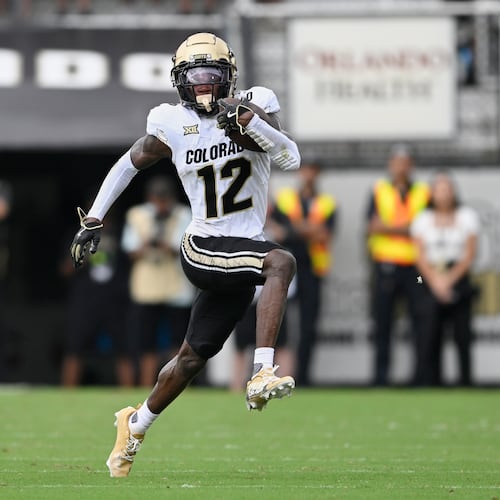Tony Greene got the call Monday that he had waited since 2009 to receive. John Adams, the NCAA’s director of officiating, rang to tell Greene that he’ll call a game at the Final Four in his hometown.
This will mark Greene’s seventh Final Four as a referee since 2001. (If he’s assigned to work the championship game, it will be his fifth — and his third in the Georgia Dome.) But he wasn’t chosen for the past three Final Fours, making this assignment especially satisfying.
“I wasn’t angry at anyone,” Greene said, speaking of being bypassed those three years. “Each year I prepare myself mentally and physically. It’s like a player — you want to be in the championship game. For us, that’s the Final Four. So it was disappointing.”
But now he’s back on the biggest stage, and he won’t have to board a plane to get there. Greene lives in Stone Mountain, and in real life he’s a project manager for the state of Georgia in economic development. (He spoke this week from Savannah, where he’s touring a site.)
A slender and dignified man, Greene brings a high grade of gravitas to a sport that operates on the edge of hysteria. He might miss the occasional call — all refs do — but he runs a game as well as anyone, and as an example we refer to his previous assignment.
Greene was the lead official for Sunday’s Midwest Regional final in Indianapolis. The opposing coaches were Mike Krzyzewski and Rick Pitino, famous men used to getting their way. NCAA president Mark Emmert was seated at the scorer’s table.
With 6:44 remaining the first half, Greene was stationed on the right wing when Duke’s Tyler Thornton rose to shoot. Louisville’s Kevin Ware, a sophomore from Rockdale County, ran and leaped to challenge the shot. Watch the tape, and you’ll see Greene with both arms raised — the signal for a 3-pointer — not 10 feet away as Ware flies out of bounds.
Said Greene: “I was on the shooter one-on-one. My job is to protect the shooter. Kevin had gone past him, so I was clear on that. I saw Kevin fall with my peripheral vision, but thought he was OK. I turned to run down the court, and I heard Pitino yelling, ‘Tony, Tony! I need help!’ I started to approach, and I had to turn around again. I had never, ever seen anything like that.
“Once we knew the extent of his injury (a badly broken right leg), we had to watch the players’ emotions. They had never gone through anything like that. We left Kevin to the medical authorities, and the only thing I could think was appropriate for me to say was to tell his teammates, ‘You guys just need to pray right now.’”
An already charged game had been heightened by the worst injury ever seen in a college basketball game. It fell to Greene and his crew to keep passions from running over. They called a lot of fouls, but they let the players decide the outcome, not that all parties were immediately appreciative.
Just before Ware was injured, Duke forward Ryan Kelly was assessed a third foul. Krzyzewski spent 45 seconds bending Greene’s ear. Greene never looked at Coach K or changed expression. He let him vent and went on with his business.
“He was just being a coach, looking out for his team,” Greene said of the Krzyzewski rant. Then this: “I have more tolerance now. Years bring about maturity.”
Greene, who’s 54, decided he wanted to be a referee in 1983 while watching a high school game in Miami. He wondered, “What would I do if people were booing me?” After graduation from Oglethorpe University, he became a Division I referee in 1988. He started in the Mid-Eastern Athletic Conference, and soon he found a mentor.
John Guthrie, once the basketball coach at Georgia and then the SEC’s director of officiating, told Greene he needed to move to Atlanta if he wanted better assignments. “Coach Guthrie taught me to understand the game,” Greene said. “He taught me about advantage/disadvantage, about how to manage coaches.”
By 1994, Greene was calling SEC games. Today he works in nearly every major conference and will do more than 60 games in a given season. He’s on TV so much he’s recognized when he travels, but rarely to adverse effect. “People on flights are pretty courteous,” he said.
It’s often said that being a ref is a thankless job, but there’s a special satisfaction that comes from knowing you’ve done a difficult job well. That was the feeling Greene had Sunday night in Indianapolis. “We thought that we’d handled it appropriately,” he said. “The teams didn’t do anything out of line.”
On his phone that night was a message from Angela Guthrie, whose husband, John, died in 2010. “She said she was proud of me,” Greene said, “and she knew coach Guthrie would have been, too.”
About the Author
Keep Reading
The Latest
Featured

